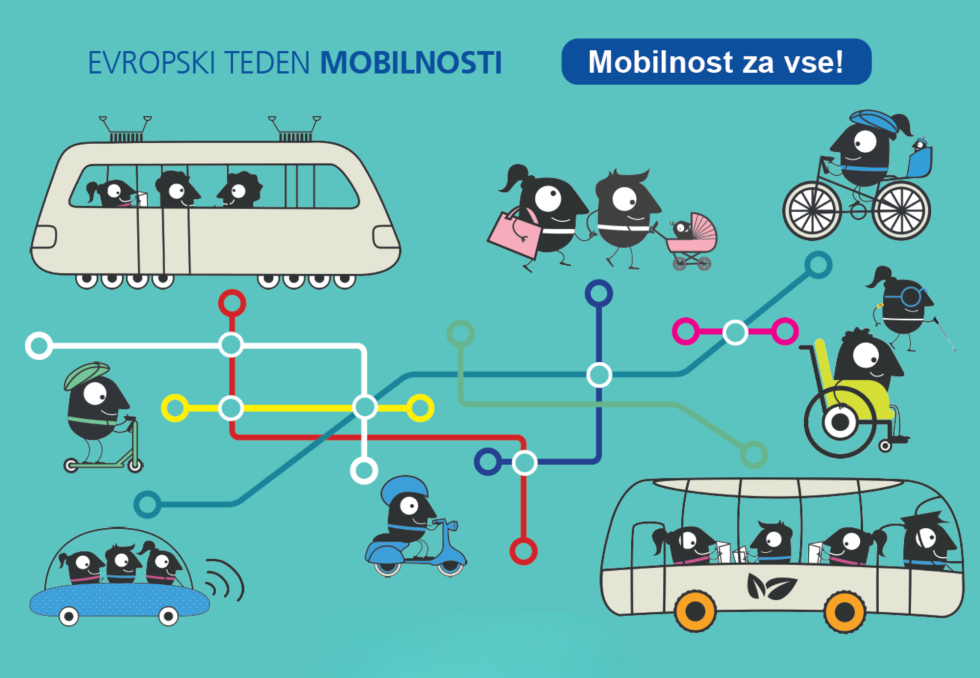European Mobility Week: Together for fair and accessible mobility
From 16 to 22 September, 133 municipalities will organise events to encourage long-term changes in travel habits and provide inclusive and accessible mobility solutions.
The "Mobility for Everyone" theme focuses on ensuring equal access to sustainable modes of transport and improving mobility for all citizens, regardless of their age, physical or sensory ability, socio-economic status or place of residence. The campaign prioritises social justice and inclusive planning, as well as mobility that caters for everyone's needs. In modern transport systems, the needs of many groups, particularly the most vulnerable, are still too often overlooked.
"Mobility is not only a right, but also the foundation of an inclusive society. Access to education, employment and healthcare is not a matter of convenience; it is a matter of equal opportunity," Minister Bojan Kumer stressed on this occasion.
How sustainable is Slovenians' travel?
According to a 2021 survey from the Statistical Office of the Republic of Slovenia, a resident of Slovenia made an average of 2.2 trips per day in 2021. More than two-thirds of these trips were made by car, while only 3% were made by public transport. Cars accounted for 85% of all distances travelled, compared to just 5% by public transport. Another concerning statistic is that in 70% of car journeys, the driver was the only person in the vehicle. In 2021, Slovenian households spent almost 17% of their budget on personal mobility, which is the highest share in the European Union. This is hardly surprising given that Slovenia had 1,230,565 registered private cars by the end of 2023, eight times the number in 1970.
The Ministry of the Environment, Climate and Energy acts as a national coordinator, connecting and supporting local communities, organisations, and individuals in their efforts to change travel habits. This year, the ministry is calling on all participants to implement more sustainable solutions that will encourage long-term changes in travel behaviour and ensure inclusive and accessible mobility. Key measures include:
- Efficient and accessible public transport – reliable, frequent, safe and affordable;
- On-demand transport – especially for the elderly and in sparsely populated areas;
- Carpooling, shared rides and P+R car parks – local solutions for better connectivity;
- Well-developed infrastructure for pedestrians and cyclists – safe, accessible and adapted for all users;
- Access to information – clear timetables and easy-to-use route planning tools;
- Subsidies and solidarity mechanisms – reducing the economic burden of mobility.
Slovenia has participated in the European Mobility Week initiative since its very beginning
Organised under the auspices of the European Commission since 2002, Slovenia has taken part every year. The initiative has grown every year in terms of the quantity and quality of the measures implemented. Alongside promotional activities that encourage sustainable mobility, an increasing number of permanent measures are being introduced, including newly built or improved infrastructure for pedestrians and cyclists, new public transport lines, better-equipped public transport stations and stops, public bike- and car-sharing schemes, the removal or redesign of parking spaces, and traffic-calming measures in settlements.
EMW 2025 will once again be an opportunity for us all to take a step forward towards fairer, safer and more environmentally friendly mobility for everyone. The Ministry of the Environment, Climate and Energy is therefore inviting all residents, municipalities, public institutes, companies and organisations to join the initiative and help create a future in which sustainable mobility becomes a way of life.
"Every change, no matter how small, counts. If we choose to walk, cycle, carpool or use public transport during European Mobility Week, we will be contributing to a healthier lifestyle, a cleaner environment, and a more enjoyable everyday life in our communities. Let this year's European Mobility Week be an opportunity for us to take a step in the right direction together," added Minister Kumer.
This year, an impressive 133 municipalities are participating in EMW, publicising their programmes of activities through their own channels. In response to the Ministry's public call for co-financing the preparation and implementation of EMW activities, with a total budget of EUR 350,000, 72 municipalities applied, and 52 of these received support for their activities. Several municipalities opted for projects addressing transport poverty, including the introduction of on-demand transport services, improvements to public transport accessibility, upgrades to safe walking and cycling routes, and working with vulnerable groups.


